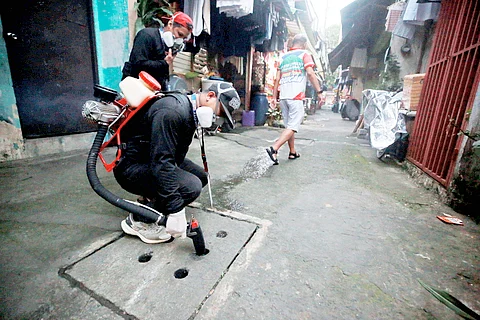
- NEWS
- the EDIT
- COMMENTARY
- BUSINESS
- LIFE
- SHOW
- ACTION
- GLOBAL GOALS
- SNAPS
- DYARYO TIRADA
- MORE

Dengue cases nationwide have declined by five percent, the Department of Health (DOH) reported on Friday.
From 15,905 dengue cases logged from 5 to 18 January, the DOH has recorded 15,134 from 19 January to 15 February.
The DOH attributed the downtrend to heightened public awareness, frequent clean-up drives to search and destroy stagnant water mosquito breeding sites, and misting or fogging in hotspot areas with high mosquito vector loads.
Meanwhile, the total number of dengue cases from January to 15 February is now at 43,732, which is 56 percent higher than the 27,995 cases recorded in the same period last year.
However, the case fatality ratio (CFR) this year is 0.38 percent, lower than 0.42 percent observed last year. This indicates timely diagnosis and appropriate management, according to the DOH.
The highest case counts were found mostly in three regions:
Calabarzon – 9,113 cases
Metro Manila – 7,551 cases
Central Luzon – 7,362 cases
Moreover, data show that younger age groups are most affected, with most cases occurring among children aged 10 to 14 years old and 5 to 9 years old.
Parents and caregivers are urged to take protective measures, including dressing children in long-sleeved clothes and pants, applying mosquito repellents, using mosquito nets while sleeping, and avoiding mosquito-prone areas.
DOH Secretary Ted Herbosa reminded the public to seek early consultation for symptoms such as high fever (40 degrees Celsius or higher), headache, abdominal pain, nausea, vomiting, or rashes.
"Consult early if you have symptoms. Don't worry about the cost, PhilHealth will cover it," Herbosa said.
The Philippine Health Insurance Corp. (PhilHealth) earlier reminded the public of the increased health benefit package for dengue amid the rise of the mosquito-borne disease.
The cost of hospitalization for severe dengue is now covered up to P47,000, an increase from P16,000.
Meanwhile, coverage for mild dengue cases has risen to P19,500 from the previous P10,000.
